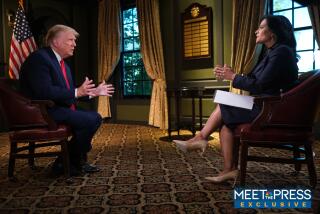A Strategy That Bears Repeating
- Share via
One year after his election, Dan Quayle has achieved all he ever wanted: He has become dull.
His coming-out party last Sunday was a true test of his new ability to not make news. He went on “Meet the Press.”
This was no small thing. During his entire campaign for the vice presidency, Quayle refused all requests from such national interview shows. He didn’t appear on “Meet the Press” or “This Week With David Brinkley” or “Face the Nation.”
And he didn’t do so because back then he was making too much news. His every slip, his every gaffe, his every goof was news.
He was the stuff of nightly TV monologues. “A lot of people feel Quayle is just too inexperienced for a do-nothing job,” Jay Leno once said.
That joke was not only funny, but it got to the heart of a strange phenomenon: Americans didn’t give a damn about the vice presidency (Mike Dukakis tried to make Quayle a major issue and failed), but some also felt that Quayle wasn’t qualified for a job that had no qualifications.
So when Quayle got to Washington, he got there with one goal: Support the President and make himself a very small target. Stay out of the headlines and give no reason for anyone to dump him in 1992.
“We had asked him on the show a number of times,” Christie Basham, senior producer of “Meet the Press” told me, “but he always declined. We renewed our request and then after saying he would not do the show, he changed his mind and said he would. It was the 42nd anniversary of the show and we wanted someone above and beyond the usual guest.”
And it says something about Dan Quayle’s reputation that he would be considered “above and beyond” the usual guest. Normally, a vice president would not be. That’s because vice presidents don’t actually do anything. They don’t run departments or make policy. They mostly wait for heads of state to expire. As George Bush once joked about his duties as vice president: “You die; I fly.”
But Quayle was considered a hot TV guest because he might screw up. He might make a mistake or say something outrageous or disagree with the President.
None of this happened. The show was uneventful. Quayle answered all the questions put to him and he made little if any news. Some major newspapers didn’t even bother to do a story the next day.
It was everything Quayle had hoped for.
I asked David Beckwith, his spokesman, why Quayle had waited so long to go on a major interview show.
“Well, he wanted to concentrate on the more important part of the job,” Beckwith said. “He wanted to solidify his relationship with the President and learn the inner workings of the administration.”
So why go on now?
“It seemed like a particularly opportune week,” Beckwith said. George Bush and Mikhail Gorbachev had announced a summit. Central America was back in the news. And, oh yeah, Bush had said Dan Quayle would be on the ticket in 1992.
“And Marlin (Fitzwater, Bush’s spokesman) called and just suggested we do the show,” Beckwith said.
The selection of Dan Quayle had been Bush’s first major (and some would say only) decision of his presidential campaign. He had input from a number of people, but Quayle was George Bush’s choice.
Many thought it was a terrible choice, but there is nothing like a victory to give everything a rosy glow. And Bush’s announcement that Quayle would be his running mate again was Bush’s way of saying: “I didn’t screw up the first time. I made a decision and it was the right decision and just to show you how right it was, I am making it again.”
And now was the time for Quayle to go on “Meet the Press” and show everybody just how right George Bush had been.
I asked Beckwith if Quayle had been pleased by how the show had gone.
“He was especially pleased with the seriousness of the questions,” Beckwith said. “A lot of the time, you never know what you’re going to get into. Sometimes the questions can be not particularly serious.”
A typical example of a “non-serious” question often put to Dan Quayle is: “Why does everyone say your wife is smarter than you?”
But Quayle got no questions like that last week. I asked Christie Basham of “Meet the Press” if Quayle had asked in advance who the questioners would be. “Yes,” Basham said, “but almost all the guests do.”
Quayle’s questioners were David Broder of the Washington Post and Elizabeth Drew of the New Yorker, both of whom stuck to serious questions. (If Quayle had been told the questioners were going to be Hunter Thompson and Jimmy Breslin, I have a feeling Quayle might have come down with laryngitis.)
After the show, Fitzwater called Quayle to express his, and presumably the President’s, pleasure at how Quayle had handled himself.
Quayle had said very little and he had said it very well.
“The very limitations of a vice president’s role don’t make him an ideal guest,” Beckwith admitted. “Almost by job description, a vice president is not permitted to make serious news.”
And Quayle knows his future is in sticking to that. During the 1988 campaign, I interviewed Quayle and I came away with one overwhelming impression: Dan Quayle would run for President in 1996.
And he will do so, I believe, by being a vice president who keeps his head down, his nose clean and his life dull.
After all, it worked for George Bush.
More to Read
Get the L.A. Times Politics newsletter
Deeply reported insights into legislation, politics and policy from Sacramento, Washington and beyond. In your inbox twice per week.
You may occasionally receive promotional content from the Los Angeles Times.










